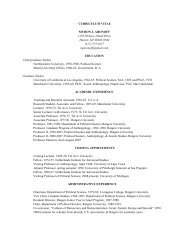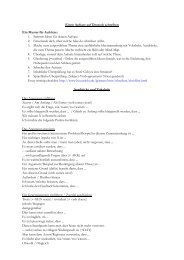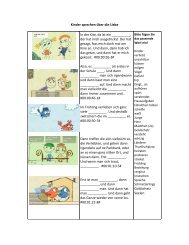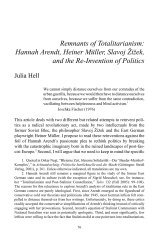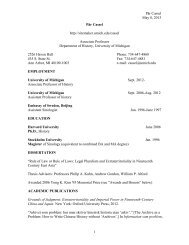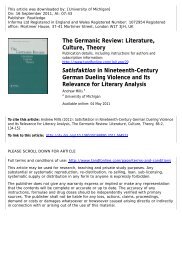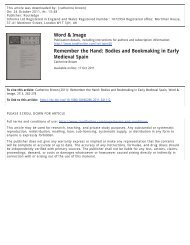Making History Personal: Constantine Cavafy and the Rise of Rome
Making History Personal: Constantine Cavafy and the Rise of Rome
Making History Personal: Constantine Cavafy and the Rise of Rome
You also want an ePaper? Increase the reach of your titles
YUMPU automatically turns print PDFs into web optimized ePapers that Google loves.
Frier, “<strong>Making</strong> <strong>History</strong> <strong>Personal</strong>,” page 35<br />
none<strong>the</strong>less remained ostensibly loyal to <strong>Rome</strong> throughout <strong>the</strong> war. His caution is easily unders-<br />
tood; it was only a few years previously that he had finally paid <strong>of</strong>f <strong>the</strong> heavy war indemnity his<br />
fa<strong>the</strong>r <strong>and</strong> <strong>the</strong>n his bro<strong>the</strong>r remitted to <strong>Rome</strong> after <strong>the</strong> disastrous battle <strong>of</strong> Magnesia. Fur<strong>the</strong>r,<br />
Antiochus himself had formerly been a political hostage at <strong>Rome</strong>. Finally, <strong>the</strong> Senate’s suspi-<br />
cions <strong>of</strong> Antiochus are well documented. Although <strong>the</strong> incident with <strong>the</strong> young Antiochene is<br />
<strong>Cavafy</strong>’s free invention, it is consistent with recorded history.<br />
While this history suffices, <strong>the</strong> resulting poem may <strong>the</strong>n seem unexpectedly thin. Why<br />
did <strong>Cavafy</strong> find this invented situation so intriguing, enough to bring him back to <strong>the</strong> poem more<br />
than a decade after its first draft? The probable answer is that <strong>Cavafy</strong> was fully aware <strong>of</strong> two<br />
additional facts—both also well known to ancient historians—that lie beyond <strong>the</strong> perimeter <strong>of</strong><br />
<strong>the</strong> poem itself <strong>and</strong> that serve considerably to deepen its irony. First, although Antiochus IV was<br />
in point <strong>of</strong> fact highly averse to challenging Roman policies, he had been more than ready to take<br />
advantage <strong>of</strong> <strong>Rome</strong>’s engagement with Perseus in order to pursue his own gain elsewhere. During<br />
169/168, Antiochus was so successful in his war with Ptolemaic Egypt that his armies ap-<br />
proached <strong>the</strong> walls <strong>of</strong> Alex<strong>and</strong>ria. Antiochus’ preoccupation with his Egyptian war would<br />
doubtless have precluded aid to Perseus even had he been so inclined, but it also illustrates Cava-<br />
fy’s frequent point about <strong>the</strong> failure <strong>of</strong> <strong>the</strong> Hellenistic kingdoms to attain unity against a common<br />
foe.<br />
Antiochus IV <strong>and</strong> Popilius Laenas, by Augustyn<br />
Mirys (1700-1790)<br />
(http://www.art.com/gallery/id-c24842/polish-art-prints_p2.htm)<br />
Second, <strong>Cavafy</strong>’s mention <strong>of</strong><br />
<strong>the</strong> battle <strong>of</strong> Pydna is more than just<br />
casual. The immediate outcome <strong>of</strong><br />
<strong>the</strong> battle was calamitous not only for<br />
<strong>Rome</strong>’s military enemies, but even for<br />
g<strong>and</strong>istic pretext for <strong>the</strong> Third Macedonian War (see Livy, 42.13.3; Appian, Macedonian Wars 11.2). On <strong>the</strong> causes<br />
for <strong>the</strong> war, see Gruen, Hellenistic World (1984) 408-419.






